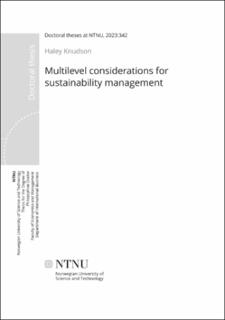Multilevel considerations for sustainability management
Doctoral thesis
Permanent lenke
https://hdl.handle.net/11250/3103821Utgivelsesdato
2023Metadata
Vis full innførselSamlinger
Sammendrag
This thesis investigates how the concept of business models for sustainability (BMfS) supports and enables sustainability management in organizations, along with how the concept can bridge organizational and societal system levels for wider sustainability impact within and by organizations. It distinguishes research and practice gaps and highlights the limited inclusion of sustainability in existing organizational theories. Its findings show that strong and holistic sustainability performance requires a specific perspective to the business model (BM), in which its activities are considered in relation to the multiple layers of society, sections of its value chain, and dimensions of sustainable development.
Complementing BMfS, the development of a conceptual framework, the Capacity building in Sustainability and Environmental Management (CapSEM) model, is presented. The model categorizes sustainability and environmental management methods and tools across four organizational system levels: Level 1 – production processes, Level 2 – products and value chains, Level 3 – organization and management, and Level 4 – larger societal-level systems. Organizations can engage with sustainability aspects within and across each level for incorporation into their BM, linking their operational practices with their sustainability strategy.
The thesis is of a theoretical nature and is the result of a combination of diverse qualitative and analytical research activities across the BMfS field and the CapSEM model. Empirical data was collected through the application of the CapSEM model in academia-industry contexts – each an arena to observe challenges of implementing sustainability in organizations. These challenges guide the study’s suggestion of using BMfS as a cognitive frame for sustainable business development from a multilevel approach.
The appended papers, and the experiences gathered throughout their elaboration, expose the breadth of levels and dimensions required to pragmatically address sustainability management. The thesis outlines a contribution to a multilevel sustainability management theory built on the following foundations:
* Changing the focal unit from the firm to the value network
* Requiring the firm and its stakeholders be an integrated unit
* Using a BMfS to conceptualize organizational needs and objectives and to map the ways certain mechanisms may support or hinder an organization’s long-term goals
* The CapSEM model is one approach to support an organization to:
- position itself in the multilevel system;
-practically identify and apply tools and methods to improve and report upon its sustainability performance; and
- find a common vocabulary and conceptualization to discuss interwoven sustainability challenges with its stakeholders.
The thesis finally asserts that though integrating existing management theories into a multilevel approach is valuable, a theory that sufficiently captures the complexity and urgency of sustainability cannot be a collection of their parts. While contributions to such approach were made in this study, more research is required to explore and interpret the multiple systems in which organizations operate, and the tensions and value conflicts that result.
Består av
Paper 1: Fet, Annik Magerholm; Knudson, Haley. An Approach to Sustainability Management across Systemic Levels: The Capacity-Building in Sustainability and Environmental Management Model (CapSEM-Model). Sustainability 2021 ;Volum 13.(9) s. - This article is an open access article distributed under the terms and conditions of the Creative Commons Attribution (CC BY) licensePaper 2: Fet, Annik Magerholm; Knudson, Haley. Transdisciplinarity for sustainability management. I: Transdisciplinarity For Sustainability: Aligning Diverse Practices. Routledge 2021 ISBN 9780367189075. s. 93-117. Copyright © 2021 selection and editorial matter, Martina M. Keitsch and Walter J.V. Vermeulen.
Paper 3: Knudson, Haley Michele; Keitsch, Martina Maria. Helping Business Contribute to a Sustainability Transition: Archetypes of Business Models for Sustainability. I: Business Transitions: A Path to Sustainability. The CapSEM Model. Springer Nature 2023 ISBN 978-3-031-22244-3. s. 223-239. Open Access This book is licensed under the terms of the Creative Commons Attribution 4.0 International License (http://creativecommons.org/licenses/by/4.0/).
Paper 4: Knudson, Haley Michele. Examining institutional influences and values in sustainability management. Working paper.
